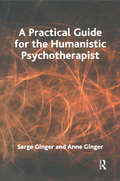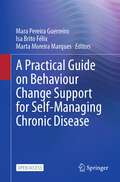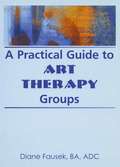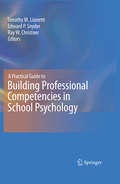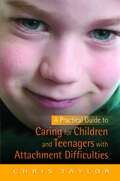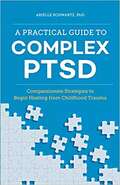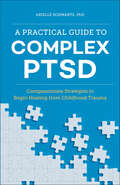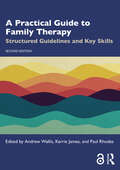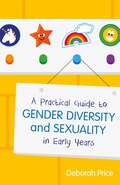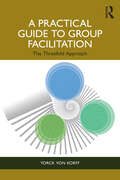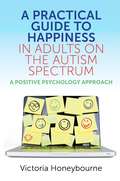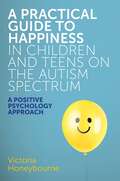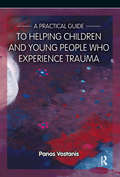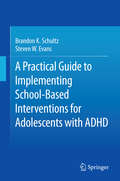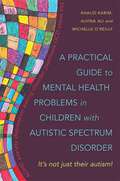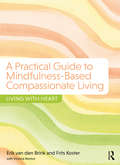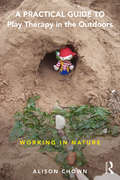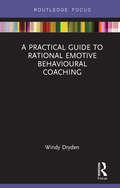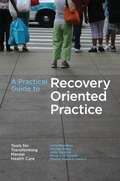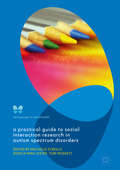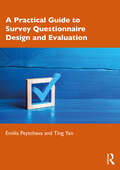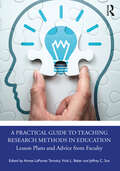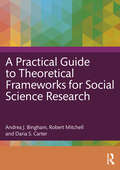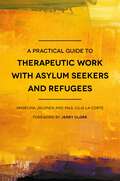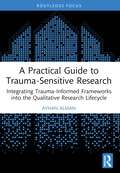- Table View
- List View
A Practical Guide for the Humanistic Psychotherapist
by Anne Ginger Serge GingerThis book attempts to answer questionings by practitioners from various humanistic-existential approaches, such as transactional analysis, Gestalt therapy, person-centred approach, Ericksonian hypnosis, psychosynthesis, psycho-organic analysis, and psycho-drama, as well as family therapy.
A Practical Guide on Behaviour Change Support for Self-Managing Chronic Disease
by Mara Pereira Guerreiro Isa Brito Félix Marta Moreira MarquesThis open access book is a valuable resource for students in health and other professions and practicing professionals interested in supporting effective change in self-management behaviors in chronic disease, such as medication taking, physical activity and healthy eating.Developed under the auspices of the Train4Health project, funded by the Erasmus+ program of the European Union, the book contains six chapters written by international contributors from different disciplines. Chapter one introduces the competencies necessary for delivering effective behavior change support, based on an established program of work, and related learning outcomes. The four following chapters describe how these competencies can be acquired, focusing on concepts and theories, assessing self-management behaviors, implementing change strategies and person-centered communication, using a practical approach. The last chapter points out supplementary learning resources, developed as part of the Train4Health project.
A Practical Guide to Art Therapy Groups
by Diane SteinbachAre you in need of some variety and imagination for your art therapy repertoire? If so, this is the book for you! Diane Fausek&’s unique approaches, materials, and advice will inspire you to tap into your own well of creativity to design your own treatment plans. A Practical Guide to Art Therapy Groups lays out the ingredients and the step-by-step plans, but it&’s up to you to mix in your own caring and therapeutic skills to get the results you want.A Practical Guide to Art Therapy Groups is the only book of its kind. It gives you not only fresh ideas, but also specific directions on topic and material implementation. With the book&’s specific guidelines and practical advice, you will find planning therapeutic group sessions easier and less time-consuming. When struggling for ideas, you can turn to this book as a source for many appealing themes and issues, already organized and grouped together with compatible materials for your convenience. You will learn how to: interweave fabric techniques and collage with personal philosophies and challenges enhance sensory stimulation through collage use painting techniques to improve abstract thinking skills and the ability to find images develop collage techniques using both traditional and nontraditional materials employ nature objects that emphasize clients’own natural flaws and strengths use stencils and the individual&’s silhouette to focus thoughts and energies at self-definition and group dynamicsWithin this book, you&’ll find many successful treatment plans that have been used in long-term care settings with clients affected by Alzheimer&’s, stroke complications, geri-psychiatric conditions, and developmental disabilities. Each plan can be adapted to fit your particular setting and the needs of your clients. Whether you are a student, a counselor, an art therapist, or an activity director, A Practical Guide to Art Therapy Groups can help you provide innovative, fun, and therapeutic opportunities for your clients and open the doors to communication.
A Practical Guide to Building Professional Competencies in School Psychology
by Edward P. Snyder Timothy M. Lionetti Ray W. ChristnerDesigned as a research-based yet matter-of-fact guide for beginning and future scientist-practitioners, A Practical Guide to Building Professional Competencies in School Psychology skillfully augments the reader's training, supervision, and experience by providing a framework for honing essential skills in the field. This reader-friendly, evidence-based text encourages the continuing development of expertise in communication and collaborative skills, diversity awareness, technical knowledge, and other domains critical to building and maintaining an ethical, meaningful practice. Each chapter in this must-have volume examines a core area of expertise in depth, and provides checklists (linked to competencies set out in NASP's Blueprint III) and the Development and Enhancement of Competencies Assessment Form are included to enable readers to gain a more complete understanding of their professional strengths and needs. The skill sets covered include: Developing cross-cultural competencies.Evaluating students with emotional and behavioral problems.Assessing student skills using a variety of approaches.Preventing and intervening in crisis situations.Consulting with families, colleagues, and the community.Facilitating mental health services in the school setting.A Practical Guide to Building Professional Competencies in School Psychology provides an invaluable set of professional development tools for new practitioners and graduate students in school psychology.
A Practical Guide to Caring for Children and Teenagers with Attachment Difficulties
by Chris TaylorThis book guides childcare professionals through attachment theory and provides techniques for caring for children with attachment difficulties. It explains what attachment is, what different patterns of attachment look like in children and young people, how early attachment experiences affect their lives, and how this understanding can help childcare workers to develop therapeutic ways of caring. By understanding these issues, childcare workers are better equipped to help and support the troubled children they care for. This book shows how to promote recovery through secure base experiences in a therapeutic environment and provides solutions and methods to tackle challenging and problem behaviour, anger and the effects of trauma in children with attachment problems. This essential book will be invaluable to professionals such as residential carers, social workers and foster carers who work in a therapeutic environment with vulnerable and troubled children and young people.
A Practical Guide to Complex PTSD: Compassionate Strategies to Begin Healing from Childhood Trauma
by Arielle SchwartzReclaim yourself from childhood trauma―evidence-based strategies for healing complex PTSD. <p><p> Repetitive trauma during childhood can impact your emotional development, creating a ripple effect that carries into adulthood. Complex post-traumatic stress disorder (C-PTSD) is a physical and psychological response to these repeated traumatic events. A Practical Guide to Complex PTSD contains research-based strategies, tools, and support for individuals working to heal from their childhood trauma. You don’t have to be a prisoner of your past. <p><p> Learn the skills necessary to improve your physical and mental health with practical strategies taken from the most effective therapeutic methods, including cognitive behavioral therapy (CBT), dialectical behavioral therapy (DBT), eye movement desensitization and reprocessing (EMDR), and somatic psychology. When appropriately addressed, the wounds of your past no longer need to interfere with your ability to live a meaningful and satisfying life.
A Practical Guide to Complex PTSD: Compassionate Strategies to Begin Healing from Childhood Trauma (Healing Complex PTSD)
by Arielle SchwartzA Practical Guide to Complex PTSD contains research-based strategies, tools, and support for individuals working to heal from their childhood trauma. You don't have to be a prisoner of your past.Repetitive trauma during childhood can impact your emotional development, creating a ripple effect that carries into adulthood. Complex post-traumatic stress disorder (C-PTSD) is a physical and psychological response to these repeated traumatic events. Learn the skills necessary to improve your physical and mental health with practical strategies taken from the most effective therapeutic methods, including cognitive behavioral therapy (CBT), dialectical behavioral therapy (DBT), eye movement desensitization and reprocessing (EMDR), and somatic psychology. When appropriately addressed, the wounds of your past no longer need to interfere with your ability to live a meaningful and satisfying life.This book will have you:Understanding C-PTSD—Get an in-depth explanation of complex PTSD, including its symptoms, its treatment through various therapies, and more.Addressing your symptoms—Discover evidence-based strategies for healing the symptoms of complex PTSD, like avoidance, depression, emotional dysregulation, and hopelessness.Relating to real stories—Relate to others' experiences with complex PTSD with multiple real-life examples included in each chapter.Let go of the pain from your past with A Practical Guide to Complex PTSD!
A Practical Guide to Family Therapy: Structured Guidelines and Key Skills
by Andrew Wallis Paul Rhodes Kerrie JamesGrounded in systemic family therapy and drawing on a variety of other models to enhance skills development, this book is a comprehensive, practical guide to working with families.This second edition is thoroughly updated and includes new chapters which cover working with First Nations Families, diversity and family therapy, understanding emotions, and dialogical reflective processes. The book begins with a focus on the therapeutic relationship and use of self as a foundation, and from there provides the reader with practical, skill-oriented guidelines for working with families. From the first session to addressing the complexities of separated parents, parent-child relational breaches, family of origin issues, wider systems, managing emotions, diversity, and much more, the book takes the reader through core practices that will become essential skills for family work.Written by an expert team of authors committed to innovative and contextual practice, this book is for experienced clinicians who want to learn to work with families and for beginning therapists to learn from a structured approach to developing complex skills.
A Practical Guide to Gender Diversity and Sexuality in Early Years
by Deborah PriceAiding discussion of gender diversity and sexuality with very young children, this practical guide helps practitioners explore these themes in early years settings. Promoting and extending current good practice, the book offers advice and activities that will support children in discovering their identity and also demonstrates how to work with parents. This guide presents a background to gender theory alongside examples and case studies, showing that activities and settings can work together for children to recognise their full potential in a supportive environment. This book addresses a wide variety of topics such as staff training and team management, how to support and promote men working in childcare, transgender issues and ways practice can be challenged, to give those working with young children a great foundation for teaching about diversity. Proposing aims that early years practitioners can work towards and providing practical ideas to take directly in to the workplace, this hands-on guide sets out to create and encourage outstanding practice for all professionals teaching young children.
A Practical Guide to Group Facilitation: The Threefold Approach
by Yorck von KorffA Practical Guide to Group Facilitation introduces a unique threefold approach to facilitation, blending Person-Centered Practice, system knowledge, and method expertise together. It serves as a comprehensive resource for facilitators seeking to enhance their professional skills.The book delves into the significance of Person-Centered Practice as the cornerstone of facilitation, exploring personal facilitator qualities like congruence, empathic listening, and unconditional positive regard, inspired by the principles of Carl Rogers. It successfully integrates Jane Loevinger's personal development theories with facilitator skill development, illustrating the symbiotic relationship between personal growth and effective facilitation. Additionally, the book incorporates Nonviolent Communication (NVC) into the facilitator's toolkit, offering practical strategies for navigating challenging situations. It covers a spectrum of facilitation methods, from structured approaches to the Person-Centered style of Carl Rogers, equipping facilitators to face diverse group contexts.Presenting valuable skills and insights to enhance professional practice, this book will be highly relevant reading for facilitators, mediators, and those offering training. It will also be useful reading for professionals in participatory processes such as coaches, team leaders, organizational leaders, managers, and mentors.
A Practical Guide to Happiness in Adults on the Autism Spectrum: A Positive Psychology Approach
by Victoria HoneybourneClear and engaging, this book offers a refreshing positive psychology approach to mental health and autism. Moving away from neurotypical views of happiness, it sets out simple techniques to help adults on the spectrum improve their mental health. Packed with helpful exercises for individuals and groups, it covers topics such as recognising character strengths, dealing with negative self-talk, building communication skills and self-awareness, and forming coping strategies for the workplace. Autistic individuals and professionals who work with them will find flexible and practical solutions to recurring negative thoughts, helping clear the path to a successful and happy future. A must-read for anyone on the spectrum or those who support them.
A Practical Guide to Happiness in Children and Teens on the Autism Spectrum: A Positive Psychology Approach
by Victoria HoneybourneFull of simple strategies for happiness in children and teens with autism, this book is a must read for anyone dedicated to the wellbeing of a child on the spectrum. Bringing a refreshingly positive approach to mental health and autism, the guide is full of practical ideas for helping children strengthen their self-worth, optimism and receptivity to happiness. It also reveals how children can build resilience and better understand their feelings, giving them the skills to flourish and thrive and to ward off negative thoughts. The activities are ideal for all learning levels and can be done individually or in groups, at home or in the classroom. Talking about mental health in autism is all too often reduced to ways of 'curing illness' - this book helps to prevent poor mental health by making happiness a priority and an attainable goal.
A Practical Guide to Helping Children and Young People Who Experience Trauma: A Practical Guide
by Panos VostanisThis will be a concise and practical resource for a range of carers and practitioners working with children who experienced trauma. It will highlight their characteristics in contrast with those for children living in stability, and will describe specific techniques and strategies to help them in different environments and situations. The aim will be to equip practitioners with a range of approaches for these groups of vulnerable children, which are appropriate to sensitively meet their needs and make a difference to their emotional well-being. Key features: case studies; work-sheets; and, evidence-based interventions. It is authored by Dr Panos Vostanis, Professor of Child Psychiatry, University of Leicester; Consultant Child Psychiatrist, Leicestershire Child Mental Health Service.
A Practical Guide to Implementing School-Based Interventions for Adolescents with ADHD
by Brandon K. Schultz Steven W. EvansThis innovative volume details counseling interventions for secondary students with ADHD and its associated academic and conduct problems, particularly focusing on youth at risk for developing serious disruptive behaviors. It addresses the continuing debate over counseling for youths with ADHD by identifying key elements common to reputable therapies and suggesting a framework for their successful implementation. The core of the book discusses the Challenging Horizons Program (CHP), a behavior- and solutions-focused approach to counseling adolescents with ADHD that has been studied extensively for more than 15 years. Based on the quality of research, the CHP has been included in the National Registry of Evidence-based Programs and Practices maintained by the U. S. Substance Abuse and Mental Health Services Administration (SAMHSA). Excerpts from actual sessions illustrate typical therapist-client interactions in the CHP, and sample modules from the program's treatment literature expand the book's descriptions of effective hands-on interventions. Counseling skills featured in this book include: Bridging the research-into-practice divide. Establishing a therapeutic alliance with students with ADHD. Developing and implementing interventions for memory, organization, and planning. Enhancing young clients' social skills. Enlisting family members in the intervention process. Working directly with teachers to improve student behaviors. A Practical Guide to Implementing School-Based Interventions for Adolescents with ADHD is an essential resource for researchers, clinicians and related professionals, and graduate students in such disciplines as school and clinical child psychology, social work, educational psychology, psychotherapy and counseling, and learning and instruction.
A Practical Guide to Mental Health Problems in Children with Autistic Spectrum Disorder: It's not just their autism!
by Michelle O'Reilly Alvina Ali Khalid KarimExploring the relationship between ASD and mental health difficulties, this book offers practical guidance to help parents and professionals recognise and handle co-morbid conditions, and dispels the myth that they are just a part of autism. The authors cover a wide range of common mental health problems experienced by children with ASD, including Obsessive Compulsive Disorder (OCD), anxiety, ADHD, eating disorders, psychosis, stress, tics and depression, and illustrate these issues with case studies. They also provide vital advice in an accessible format and suggest strategies to ease the difficulties which arise from these co-morbid conditions. This book is essential reading for professionals working with children on the autism spectrum and is an accessible and practical resource for parents and carers.
A Practical Guide to Mindfulness-Based Compassionate Living: Living with Heart
by Erik van den Brink Frits Koster Victoria NortonA Practical Guide to Mindfulness-Based Compassionate Living: Living with Heart is a step-by-step guide for those who wish to deepen their mindfulness skills with compassion for a healthier, happier life and more fulfilling relationships. It offers a clear structure as well as ample freedom to adjust to individual needs, starting with learning to be kind to yourself and then expanding this to learn how to be kind to others. This guide consists of eight chapters that follow the eight sessions of the mindfulness-based compassionate living training programme. To enhance the learning experience, this book features accessible transcripts and downloadable audio exercises, as well as worksheets to explore experiences during exercises. It also includes suggestions for deepening practice at the end of each session. A Practical Guide to Mindfulness-Based Compassionate Living explores the science of compassion in an easy-to-understand and comprehensive manner, one which will appeal to both trained professionals and clients, or anyone wishing to deepen their mindfulness practice with ‘heartfulness’.
A Practical Guide to Play Therapy in the Outdoors: Working in Nature
by Ali ChownA Practical Guide to Play Therapy in the Outdoors responds to the significant and growing interest in the play therapy community of working in nature. Alison Chown provides practical ideas about why we might decide to take play therapy practice into outdoor settings and how we might do this safely and ethically. This book discusses how nature provides a second intermediate playground and can be seen as a co-therapist in play therapy. It explores the relevance of different environments to the play therapy process by considering the elements of earth, air, fire, water and wood. It looks at the way we can connect with nature to find a sense of place and details some activities to do with children in play therapy to get started. The book provides an important guide for the practitioner and talks them through the crucial guidelines that are necessary for outdoor play therapy and gives a philosophical perspective to working in nature. It will be engaging and essential reading for play therapists in training and practice.
A Practical Guide to Rational Emotive Behavioural Coaching (Routledge Focus on Coaching)
by Windy DrydenIn his clear and concise style, Windy Dryden outlines the steps and strategies that coaches using Rational Emotive Behavioural Coaching (REBC) should employ as a guide when working with coachees in development-focused REBC and in problem-focused REBC (addressing both practical and emotional problems). A Practical Guide to Rational Emotive Behavioural Coaching shows how REB coaches can address the inevitable obstacles to coaching progress that are likely to occur in all types of REBC and outlines the most common steps for each type of coaching, including common strategies for the implementation of each step. The book also includes a unique survey, developed by the author, designed to help coachees in development-focused REBC assess and evaluate healthy principles of living. The book will be an essential resource for coaches in practice and training, for professionals working in human resources and learning and development, and for executives in a coaching role.
A Practical Guide to Recovery-Oriented Practice: Tools for Transforming Mental Health Care
by Janis Tondora Larry Davidson Michael Rowe Maria J. O'Connell Martha Staeheli LawlessThis book takes a lofty vision of "recovery" and of "a life in the community" for every adult with a serious mental illness promised by the U. S. President's 2003 New Freedom Commission on Mental Health and shows the reader what is entailed in making this vision a reality. Beginning with thehistorical context of the recovery movement and its recent emergence on the center stage of mental health policy around the world, the authors then clarify various definitions of mental health recovery and address the most common misconceptiosn of recovery held by skeptical practitioners and wroriedfamilies. With this framework in place, the authors suggest fundamental principles for recovery-oreinted care, a set of concrete practice guidelines developed in and for the field, a recovery guide model of practice as an alternative to clinical case management, and tools to self-assess therecovery orientation of practices and practitioners. In doing so, this volume represents the first book to go beyond the rhetoric of recovery to its implementation in everyday practice. Much of this work was developed with the State of Connecticut's Department of Mental Health and Addiction Services, helping the state to win a #1 ranking in the recent NAMI report card on state mental health authorities. Since initial development of these principles, guidelines, and tools inConnecticut, the authors have become increasingly involved in refining and tailoring this approach for other systems of care around the globe as more and more governments, ministry leaders, system managers, practitioners, and people with serious mental illnesses nad their families embrace the needto transform mental health services to promote recovery and community inclusion. If you've wondered what all of the recent to-do has been about with the notion of "recovery" in mental health, this book explains it. In addition, it gives you an insider's view of the challenges and strategies involved in transforming to recovery and a road map to follow on the first few stepsdown this exciting, promising, and perhaps long overdue path.
A Practical Guide to Social Interaction Research in Autism Spectrum Disorders (The Language of Mental Health)
by Michelle O'Reilly Jessica Nina Lester Tom MuskettThis book introduces a novel approach for examining language and communication in autism spectrum disorder (ASD) - discourse and conversation analysis. The authors offer a set of very different perspectives on these complex issues than are typically presented in psychological and clinical work. Emerging from a range of social scientific fields, discourse and conversation analysis involve fine-grained qualitative analysis of naturally-occurring, rather than laboratory-based, interaction, enabling broad applications. Presented in two parts, this innovative volume first provides a set of pedagogical chapters to develop the reader's knowledge and skills in using these approaches, before moving to showcase the use of discursive methods through a range of original contributions from world-leading scholars, drawn from a range of disciplines including sociology, academic and clinical psychology, speech and language therapy, critical disability studies and social theory, and medicine and psychiatry.
A Practical Guide to Survey Questionnaire Design and Evaluation
by Emilia Peytcheva Ting YanA Practical Guide to Survey Questionnaire Design and Evaluation summarizes principles, guidelines, and best practices for developing and testing survey questionnaires driven and supported by theoretical and empirical research. It provides a broad overview of literature on questionnaire design, drawing on both theoretical and empirical research.This book consists of three parts. The first covers the survey response process model, which will serve as the theoretical framework to establish the basic principles of writing different types of survey questions (attitudinal, behavioral, demographic, and knowledge). The second part of this book focuses on special topics such as sensitive questions, developing questionnaires for older adults and children, designing a paper survey, designing a web survey and optimizing for a mobile device, developing questionnaires for a multimode survey, and conducting surveys in multiple languages and cultures. The third part of this book describes methods for testing and evaluating survey questions. Topics cover focus groups, cognitive interviewing, expert review, Questionnaire Appraisal System, behavior coding, respondent and interviewer debriefing, randomized experiments, and pilot studies. Given extensive web survey coverage, we also discuss usability testing of web surveys. Finally, we present a brief overview of the use of artificial intelligence and machine learning for questionnaire development and evaluation. Suggestions for further reading, case studies, and discussion questions are included in all chapters.This book will be of interest to those using survey methodology/questionnaires and graduate courses incorporating survey design across the social and behavioral sciences, including psychology, communication studies, nursing and healthcare research, sociology, anthropology, and education.
A Practical Guide to Teaching Research Methods in Education: Lesson Plans and Advice from Faculty
by Vicki L. Baker Jeffrey C. Sun Aimee LaPointe TeroskyA Practical Guide to Teaching Research Methods in Education brings together more than 60 faculty experts. The contributors share detailed lesson plans about selected research concepts or skills in education and related disciplines, as well as discussions of the intellectual preparation needed to effectively teach the lesson. Grounded in the wisdom of practice from exemplary and award-winning faculty from diverse institution types, career stages, and demographic backgrounds, this book draws on both the practical and cognitive elements of teaching educational (and related) research to students in higher education today. The book is divided into eight sections, covering the following key elements within education (and related) research: problems and research questions, literature reviews and theoretical frameworks, research design, quantitative methods, qualitative methods, mixed methods, findings and discussions, and special topics, such as student identity development, community and policy engaged research, and research dissemination. Within each section, individual chapters specifically focus on skills and perspectives needed to navigate the complexities of educational research. The concluding chapter reflects on how teachers of research also need to be learners of research, as faculty continuously strive for mastery, identity, and creativity in how they guide our next generation of knowledge producers through the research process. Undergraduate and graduate professors of education (and related) research courses, dissertation chairs/committee members, faculty development staff members, and graduate students would all benefit from the lessons and expert commentary contained in this book.
A Practical Guide to Theoretical Frameworks for Social Science Research
by Robert Mitchell Andrea J. Bingham Daria S. CarterThis practical book offers a guide to finding, choosing, and applying theoretical frameworks to social sciences research, and provides researchers with the scaffolding needed to reflect on their philosophical orientations and better situate their work in the existing landscape of empirical and theoretical knowledge. Using a multifaceted approach, the book provides clear definitions, primary tenets, historical context, highlights of the challenges and contemporary discussion and, perhaps more importantly, concrete and successful examples of studies that have drawn on and incorporated each theoretical framework. The authors define and explain the connections among such concepts as ontology, epistemology, paradigm, theory, theoretical frameworks, conceptual frameworks, and research methodology; describe the process of finding and effectively using theoretical and conceptual frameworks in research; and offer brief overviews of particular theories within the following disciplines: sociology, psychology, education, leadership, public policy, political science, economics, organizational studies, and business. The book also has a dedicated chapter on critical theories, and for each theory, provides a definition, explores how the theory is useful for researchers, discusses the background and foundations, outlines key terms and concepts, presents examples of theoretical applications, and gives an overview of strengths and limitations. This book offers a useful starting point for any researcher interested in better situating their work in existing conceptual and theoretical knowledge, but it will be especially useful for graduate students and early career researchers who are looking for clear definitions of complex terms and concepts, and for an introduction to useful theories across disciplines.
A Practical Guide to Therapeutic Work with Asylum Seekers and Refugees
by Paul Cilia La Corte Angelina Jalonen Jerry CloreThe need to support refugees has never been more urgent, but how can everyone working with them provide consistently effective care? Written for a range of professionals including therapists, teachers, social workers, housing support workers and healthcare professionals, this essential guide offers a holistic, person-centred framework to ensure that all those working with refugees to provide them with excellent support. Informed by the authors' direct work with refugees, the book starts with a comprehensive introduction to understanding the underlying issues that lead to the complex needs of an asylum seeking client group. Using an easy-to-follow 'what?', 'why?' and 'how?' structure, within the four key phases of refugee experience. It also shows professionals how to sensitively address trauma, loss and separation with clients who are adjusting to a foreign culture and language using three core principles (therapeutic relationship, bearing witness and psycho-education). Informed and accessible, this guide will help you create a safe, welcoming environment for asylum seekers in all stages of their journey to improve their psychosocial wellbeing and mental health.
A Practical Guide to Trauma-Sensitive Research: Integrating Trauma-Informed Frameworks into the Qualitative Research Lifecycle
by Ayhan AlmanA Practical Guide to Trauma-Sensitive Research showcases the novel idea of trauma-informed interventions for researchers, proposing clinical supervision as the standard rather than the exception. This framework not only aids in managing the aftermath of trauma but also opens new opportunities for both clinicians and researchers.The book details the theoretical foundations of trauma, including the latest insights into how trauma affects individuals and communities, and addresses practical applications of trauma-sensitive methodologies in research. It emphasises ethical considerations, the importance of clinical supervision, and the necessity of adopting a trauma-sensitive approach to protect both research participants and researchers from the potential emotional toll of exposure to trauma. By bridging clinical practices with qualitative research, this book not only opens new professional avenues for clinicians and researchers but also advocates for a research environment that is empathetic, ethical, and informed by a deep understanding of trauma and its impacts.A Practical Guide to Trauma-Sensitive Research will be of great utility to User Experience (UX) Professionals, such as service designers, UX designers, consultants, and researchers involved in qualitative research. Additionally, it will be of value to clinical professionals like social workers, psychologists, and psychotherapists, offering insights and supervision on applying trauma-informed approaches in non-clinical research settings.
